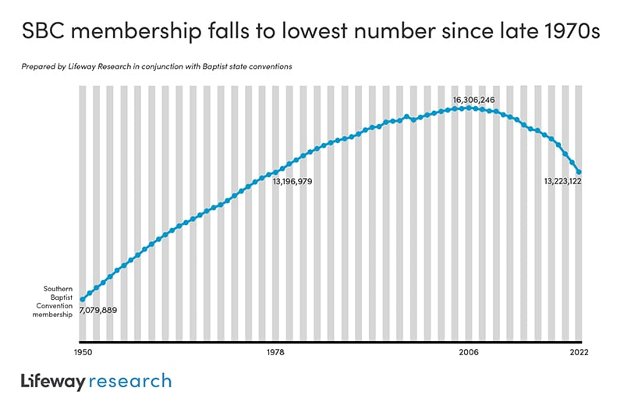I get absolutely no pleasure in relaying that the Southern Baptist Convention (SBC), America’s largest Protestant denomination, lost nearly half a million more people in 2022, adding to the three million lost since 2006.
It is their largest loss in more than a century.
At one time a denomination of 16.3 million, the SBC has declined by more than 1.5 million since 2018 alone.

One could point to numerous reasons: the rise of the nones, major sex abuse scandals, controversies over race, feuds over denominational leadership, the rise of Calvinism (yes, this has an outreach dynamic), debate over women in ministry and more.
It’s hard to know exactly where to point the finger.
But the one thing Southern Baptists shouldn’t do is deflect. As in blame the culture. Yes, we are living in a post-Christian world. Yes, the rise of the nones is real.
But this didn’t stop the early church.
As I detailed in my latest book, Hybrid Church, following Pentecost, the early church faced a largely pagan culture. A combination of personal evangelism and service to the poor and vulnerable led to a numerical explosion. By 100 A.D., there were around 7,500 followers. By the mid-300s, more than 30,000,000 called themselves followers of Christ.
So don’t tell me today’s pagan culture is a cultural roadblock.
Instead, there are two other roadblocks that can legitimately be claimed.
First, a methodological roadblock. There is simply a failure to do what needs to be done. To change where we need to change. I’ve often shocked conference audiences by saying that it is no secret how to grow a church. The problem is that churches aren’t willing to do what it takes to grow.
Which leads to the second roadblock.
The heart roadblock.
Why don’t we change? Because we don’t care if lost people go to hell. We would rather cling to how things have always been done, rather than convert to what should be done. We aren’t willing to do what it takes to reach lost people because our hearts don’t truly beat for them.
I mourn that the SBC – once known for its evangelistic cage-fighting – is now better known for its evangelistic waltzing.
But make no mistake.
Unless things change, it’s going to be a half a million more, followed by half a million more, followed by…
Read more from James Emery White »
This article originally appeared on ChurchAndCulture.org and is reposted here by permission.

